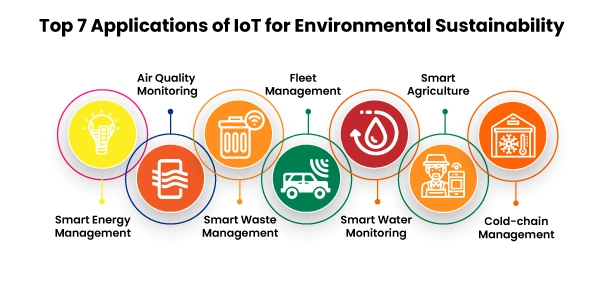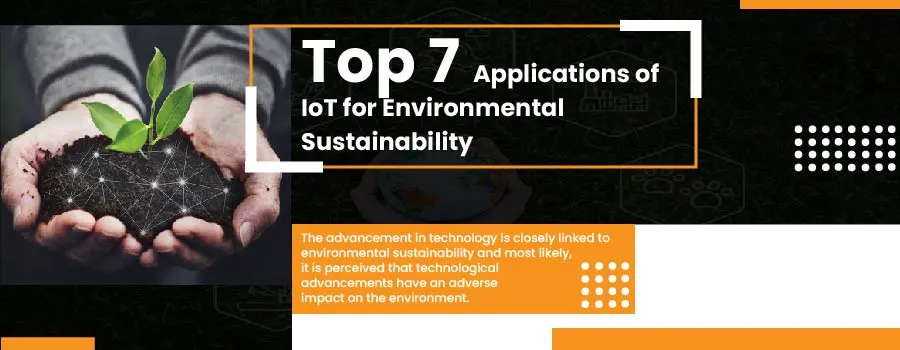The advancement in technology is closely linked to environmental sustainability and most likely, it is perceived that technological advancements have an adverse impact on the environment. Technological innovations have captured human attention in the mid-18th century, since then humans are enabled to use natural resources to a greater extent. Heavier usage of raw materials increased production and the global population have given rise to Co2 emission and resource depletion.
However, the relationship between the technology and environment has been changed now as the factors that propel sustainability and digital innovation have been disconnected. This environmentally sustainable technological change has been led by a wide range of immersive technologies such as robotics, AI and most importantly IoT. All of these technologies have the potential to change commercial and industrial procedures, along with making them environmentally friendly.
The advancement in wireless connectivity and IoT sensor technologies have mutually reinforced sustainability and digital innovation. With the IoT technologies, companies are adopting environmentally friendly practices, organizing their processes, and using resources in a responsible manner.

The following highlights the most important applications of IoT that are positively impacting the environment and helping in making the planet greener.
1. Smart Energy Management
Customers nowadays are emphasizing more on sustainable technology. IoT devices help in managing a wide range of electricity supply chains. This includes electric utilities, their energy consumption and supply from both distributors and consumer ends. These smart energy management systems not only help in reducing energy spending but also help in minimizing carbon emissions. As far as the energy usage monitoring is concerned, then it can be observed that the wireless utility meters deliver the energy consumption data at building areas, individual and industrial assets. Having these data-driven insights help companies and individuals to monitor their energy consumption and optimize it to achieve environmental sustainability.
2. Air Quality Monitoring
Air pollution is one of the emerging global concerns. As per the report published by World Health Organization, 7 billion premature death occurs worldwide due to air pollution outside and inside the home. The pollutants in the air are also lethal for human health. Poor quality air has significant ramifications on food and vegetation, renewable energy, weather and water. However, the innovative and low-cost IoT sensors have enabled the municipalities to monitor the air quality index. In this way also the root cause of air pollution is tracked in real-time and municipalities implement corrective measures to reduce air pollution which makes the environment clean for human beings.
3. Smart Waste Management
An increase in the global population is also giving rise to the amount of garbage humans produce. The inconsistent and inefficient waste collection has made the situation more miserable. IoT, with its network of wireless sensors, can combat waste and garbage collection issues by enabling facility managers to access real-time data about trash receptacles. The facility managers can decide which waste containers need to be emptied first after knowing about their current fill levels. With this information, the waste management companies can optimize their waste collection schedule, as well as lower the environmental footprint by limiting the unnecessary mobility of the waste collection trucks.
4. Fleet Management
The focus on different fuel types and their impact on the environment and air quality has been increased significantly. Governments all around the globe are also emphasizing reducing CO2 emissions. This is putting more pressure on the fleet operators to optimize their fleet management activities and make them environmentally friendly. Vehicle health, driver behavior, idle time, fuel consumption and location all play a vital role in calculating the total emission produced by the fleet. The critical insight into these metrics can be accessed with the help of wireless IoT sensors equipped in the fleets. The data from the sensors can provide useful insight into vehicle maintenance, improve driver behavior and optimize routes. For instance, IoT sensors provide a real-time location for more responsive and accurate route planning. This ultimately reduces the harmful emission resulting in the time spent by the vehicle idling in traffic.
5. Smart Water Monitoring
As per the research conducted by MIT researchers, more than half of the world’s population will be living in water-stressed regions by 2050. This highlights the rationale of adopting the solution which are focusing on water management and can substantially reduce water waste annually. Nearly, 20-30% of drinking water is wasted by pipe leaks in municipalities. Wireless connectivity and IoT sensors have substantially reduced the cost of gathering and analyzing the data from different water equipment such as valves, pumps or entire water processes like irrigation. With the help of installing IoT leak detection sensors in plants or buildings, water leaks can be detected along with controlling the water quality and monitoring the fill levels. The intelligent system can immediately alert the facility managers if any sign of a water leak is detected so that remedial actions can be taken on time. These IoT systems if installed on a larger scale can reduce water waste and can save the land from increasing water crisis.
6. Smart Agriculture
The availability of natural resources such as arable land and freshwater is continuously decreasing due to an increase in the global population. The situation has been aggravated further with the low yields of staple crops annually. The solution to meet the global demand for food lies within the concept of sustainable food production with smart agriculture which can also reduce environmental footprint and waste of resources. Smart farming systems powered by IoT technologies can help in achieving environmental sustainability. The smart devices gather data about the factors such as soil conditions etc. which contribute to crop growth. The analytics of the collected data provides useful insight about various farming practices, namely, fumigation, fertilization, irrigation and seeding etc. This data-driven information helps farmers in avoiding conditions that might impact the health of crops. Besides this, smart agriculture reduces error-prone and inefficient human interventions along with minimizing water, chemical and other resource utilization. This ultimately results in a lower environmental footprint and higher production rates.
7. Cold-chain Management
Nearly, one-third of the total food produced globally is wasted. This means that 1.6 billion tons of food is dumped every year which translates into the loss of $1.2 trillion. With food, all the energy and resources that it takes to grow, harvest and transport is also wasted and this is also an environmental concern that should be taken into account. The reason behind this huge loss is the inappropriate recording of temperatures in the food supply chain. The temperature in the food supply chain is the most important factor which can impact the quality of the food. Inappropriate temperature settings can lead to food deterioration and waste. Smart cold chains powered by wireless IoT sensors can monitor ambient conditions for the food such as light intensity, air quality, humidity and most importantly, temperature. Smart cold chains ensure no compromise is made over food quality and integrity.
To Sum up!
In the past, technology might have impacted the environment negatively, but now it has been diverted towards making the planet greener. The IoT technologies are enabling government, companies and individuals to adopt energy-efficient practices, organize processes and use resources responsibly to achieve long-term environmental sustainability.




